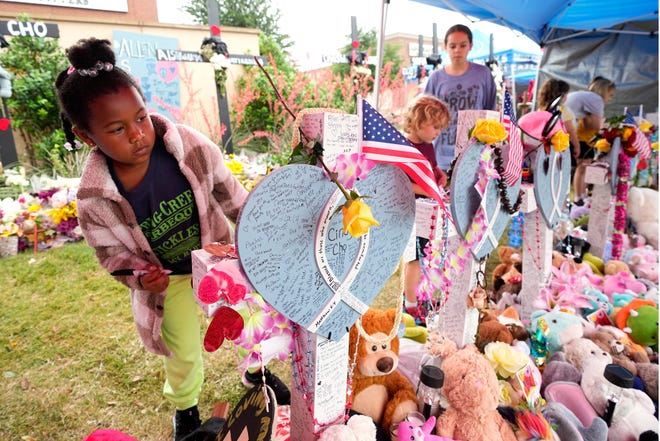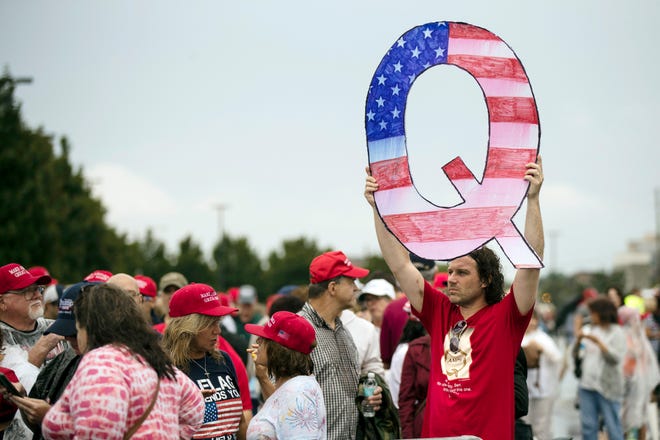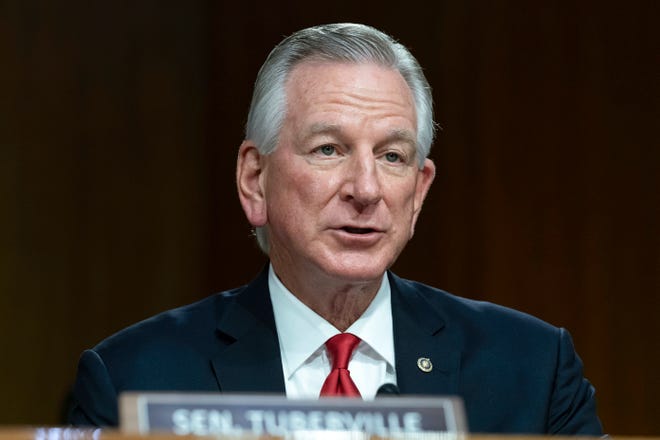
Extremism experts across the country spent much of the week revealing the extremist far-right beliefs of the man who opened fire in an Allen, Texas mall last Saturday. The shooter identified as Hispanic, which may seem incongruous, but we explain how racism and the allure of violence can cut across racial and ethnic lines. Meanwhile, a study from watchdog group Media Matters reveals a new online fundraising source for QAnon influencers, and a GOP Senator says of white nationalists in the military “I call them Americans.”
It’s the week in extremism.

Allen shooter’s apparent neo-Nazi past
More:The Allen shooter was Hispanic. He was also a white supremacist
In the wake of the tragic mass shooting at an Allen, Texas, mall on Saturday, extremism researchers across the country have been looking into the perpetrator’s past, trying to understand what led him to open fire, killing 8 people and wounding 10 others. Researchers found a profile on the Russian social media site Odnoklassniki (which means “classmates”) that they believe belonged to the shooter, who police identified as 33-year-old Mauricio Garcia.
The profile includes hundreds of photographs of what appears to be a diary, which reveal neo-Nazi views, and a misogynist ideology in which adherents call themselves “involuntarily celibate” or “incel.”
Photographs Garcia apparently posted of himself show he had neo-Nazi tattoos, including a swastika on his chest and “SS” on one arm.
- An analysis of the posts by the Anti Defamation League’s Center on Extremism concludes that while the profile includes dozens of references to white supremacy and other far-right views, it does not provide a conclusive motive for Saturday’s attack.
- “His writings, voluminous and disturbing as they are, do not provide clear indication that he undertook his shooting rampage for ideological reasons, whether of a white supremacist, incel, or other nature. His personal demons alone might have driven him to the crime,” the ADL report states.
- While Garcia’s racial and ethnic background hasn’t been detailed, as we break down in this story, white supremacist cells exist across Latin America, and some people are attracted to Nazism simply because of the barbarity of the former regime and its leader, as opposed to holding strong racial beliefs.
- The owner of the Odnoklassniki profile “gives just as many indications of mental demons as he does white supremacy or right-wing extremism,” Mark Pitcavage, a senior research fellow at the Anti-Defamation League’s Center on Extremism told USA TODAY.

Study: QAnon influencers raised nearly $200k on ‘Buy Me a Coffee’
Insurrection fundraiserInsurrection fundraiser: Capitol riot extremists, Trump supporters raise money for lawyer bills online
A new study from the watchdog group Media Matters for America, provided exclusively to USA TODAY, reveals that several influencers connected to the QAnon conspiracy theory have used the online fundraising platform Buy Me a Coffee to raise almost $200,000. That’s despite the platform’s terms of use prohibiting users sharing “information you know is false, misleading, or inaccurate.”
- The study found at least 27 QAnon figures using the platform, who have raised a combined total of more than $195,000 before Buy Me a Coffee’s 5% transaction fee.
- The study also found found more than 240 donor posts featuring variations of the QAnon slogan “where we go one, we go all,” or “WWG1WGA.”
- “Buy Me a Coffee has flown under the radar as a source of revenue for numerous QAnon and far-right figures. It’s another example of how extremist figures take advantage of a platform not consistently enforcing its rules,” Media Matters senior researcher Alex Kaplan wrote to USA TODAY in a statement. “In this case, supporters of a dangerous conspiracy theory are seemingly violating Buy Me a Coffee’s policies, and both are benefiting financially as it becomes one of the biggest crowdsourcing platforms of choice for QAnon influencers, many of whom have been banned from more mainstream platforms.”
- Buy Me a Coffee did not respond to requests for comment Thursday.

GOP Senator on white nationalists: ‘I call them Americans’
Extremism in the military13 investigations, no court-martials: Here’s how the US Navy and Marine Corps quietly discharged white supremacists
Republican Senator Tommy Tuberville from Alabama caused a stir this week when he was asked in a radio interview whether white nationalists should be allowed to serve in the U.S. military. Tuberville responded: “Well, they call them that. I call them Americans,” responded during the interview on WBHM, an Alabama public radio station.
- Tuberville’s comments drew outrage from his opponents in Congress, with Senate Majority Leader Chuck Schumer, D-N.Y., calling them “revolting.”
- Defense Secretary Lloyd Austin announced a one-day stand-down across the military to address extremism in the ranks in the wake of the Jan. 6 insurrection. Dozens of military veterans have been charged for their actions on Jan. 6, including some who were found guilty of seditious conspiracy.
- Tuberville attempted to clarify his comments on Wednesday, sending Al.com a statement: “Sen. Tuberville’s quote that is cited shows that he was being skeptical of the notion that there are white nationalists in the military, not that he believes they should be in the military.”
- Austin made stamping extremism out of the military a top priority back in 2021.
Statistic of the week: $216,000
Extremism fundraisingExclusive: Extremists raised $6.2 million on crowdfunding websites in ‘heyday’ of financing
That’s how much money a single benefactor gave to extremists and hate groups between September 2021 and April 2022, according to an analysis by the Southern Poverty Law Center’s Data Lab.
The donations were made in cryptocurrency, which has long been a favorite of far-right extremists. The donor used the currency called Ethereum, and masked the transactions using a “mixing” service that has been sanctioned for money laundering, the SPLC said. Benefactors included an anti-immigrant group and a white nationalist organization.
“The donations continue a pattern of anonymous big-money benefactors using cryptocurrency to conceal their identities and avoid accountability for funding extremists,” the center’s report said.






